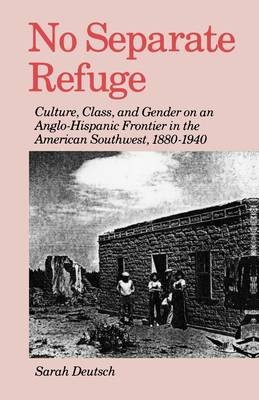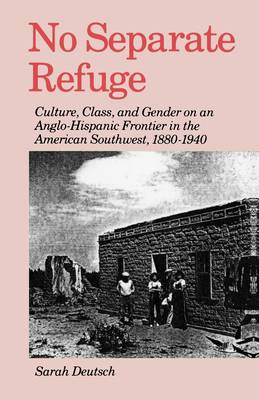
- Afhalen na 1 uur in een winkel met voorraad
- Gratis thuislevering in België vanaf € 30
- Ruim aanbod met 7 miljoen producten
- Afhalen na 1 uur in een winkel met voorraad
- Gratis thuislevering in België vanaf € 30
- Ruim aanbod met 7 miljoen producten
Zoeken
No Separate Refuge
Culture, Class, and Gender on an Anglo-Hispanic Frontier in the American Southwest, 1880-1940
Sarah Deutsch
Paperback | Engels
€ 50,45
+ 100 punten
Uitvoering
Omschrijving
Long after the Mexican-American War brought the Southwest under the United States flag, Anglos and Hispanics within the region continued to struggle for dominion. From the arrival of railroads through the height of the New Deal, Sarah Deutsch explores the cultural and economic strategies of Anglos and Hispanics as they competed for territory, resources, and power, and examines the impact this struggle had on Hispanic work, community, and gender patterns. Based on an award winning dissertation, this book analyzes the intersection of culture, class, and gender at disparate sites on the Anglo-Hispanic frontier--Hispanic villages, coal mining towns, and sugar beet districts in Colorado and New Mexico--showing that throughout the region there existed a vast network of migrants, linked by common experience and by kinship. Devoting particular attention to the role of women in cross-cultural interaction, No Separate Refuge brings to light 80 years of Southwestern history that saw Hispanic work transformed, community patterns shifted, and gender roles critically altered. Drawing on personal interviews, school census and missionary records, private letters, and a wealth of other records, Deutsch traces developments from one state to the next, and from one decade to the next, providing an important contribution to the history of the Southwest, race relations, labor, agriculture, women, and Chicanos.
Specificaties
Betrokkenen
- Auteur(s):
- Uitgeverij:
Inhoud
- Aantal bladzijden:
- 368
- Taal:
- Engels
Eigenschappen
- Productcode (EAN):
- 9780195060737
- Verschijningsdatum:
- 5/10/1989
- Uitvoering:
- Paperback
- Formaat:
- Trade paperback (VS)
- Afmetingen:
- 143 mm x 198 mm
- Gewicht:
- 462 g

Alleen bij Standaard Boekhandel
+ 100 punten op je klantenkaart van Standaard Boekhandel
Beoordelingen
We publiceren alleen reviews die voldoen aan de voorwaarden voor reviews. Bekijk onze voorwaarden voor reviews.











